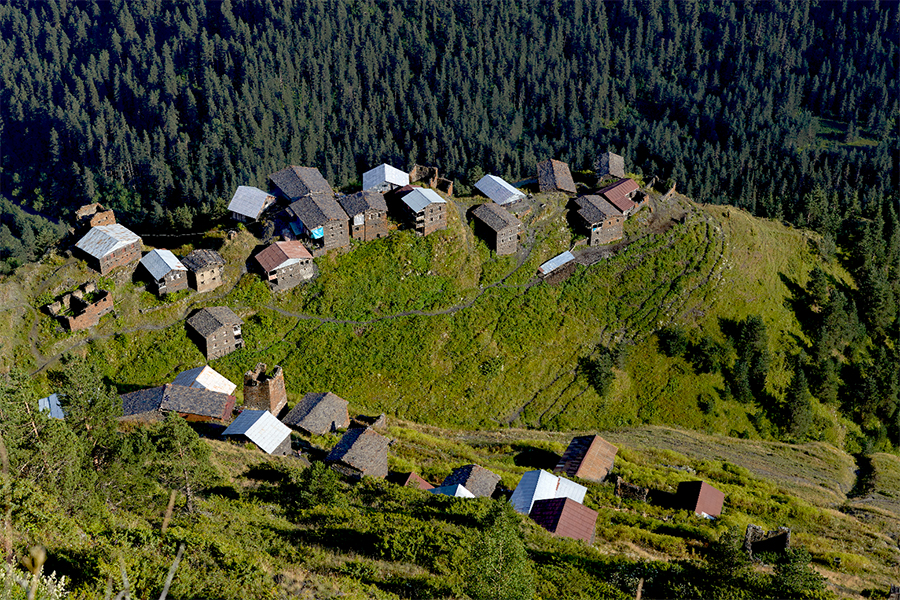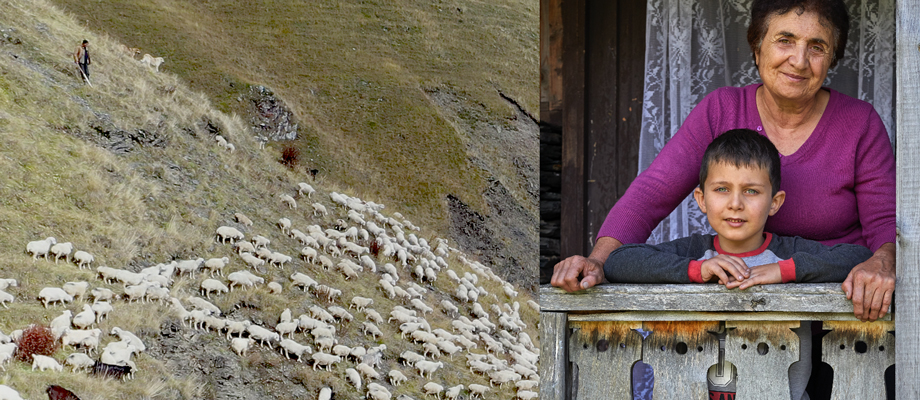Georgia is moving forward on sustainable agritourism ambitions

Earlier this summer, renowned Georgian chef Guram Baghdoshvili prepared khinkali – a traditional Georgian meat-filled dumpling – on an Instagram Live hosted by the European Bank for Reconstruction and Development (EBRD) and FAO.
As Baghdoshvili took viewers through the steps – rolling out the dough, mixing the filling, shaping the dumpling just so to prevent seepage during boiling – he shared stories of khinkali’s roots, and the traditional way people ate them during the Middle Ages.
This cooking session was the latest in a round of events organized by the EBRD and FAO to support Georgia’s sustainable agritourism ambitions.
Georgia has much to offer tourists. Its stunning natural beauty, stretching from mountains to shores, is matched by a vast array of gastronomic delights that are unique to the country.
Many recipes, like khinkali, have been passed down over hundreds of years.
The theme for this year’s World Tourism Day is rethinking tourism. In Georgia’s case, the country is keen to grow its agritourism industry in a responsible, inclusive and eco-friendly way.
The EBRD and FAO have teamed up with the Ministry of Environmental Protection and Agriculture of Georgia, the Georgian National Tourism Administration, Elkana Biological Farming Association and Georgia’s Farmers Association to help the country do just that – from developing an investment roadmap and promotional materials to organizing trainings and knowledge exchanges.
The country wants to give tourists a chance to taste authentic Georgian foods and beverages, enjoy the outdoors and come away with a greater appreciation of the local flora and fauna, age old recipes and traditions that set the country’s gastronomy apart.
Both the EBRD and FAO recognize that agritourism can help balance the needs of tourists with those of local or rural communities, offering concrete opportunities for economic and social development. At the same time, agritourism can help mitigate undesirable impacts on the environment.
“Our activities are geared to building local capacities and sharing knowledge and tips, from building understanding of legislation and investment needed to develop the industry sustainably, and setting up gastronomic routes and hiking trails that connect agritourism sites, to improving the quality of products and services on offer to create memorable tourist experiences,” said Nemanja Grgic, Principal, Agribusiness Advisory at the EBRD.

Showcasing local gastronomy
The EBRD/FAO initiative recently organized various events to promote agritourism and local products in Georgia’s Samstkhe-Javakheti and Tusheti regions.
A series of trainings for people working on agritourism farms and in the hotel, restaurant and catering industry; representatives from government and non-governmental organizations; and small-scale producers focused on the concept of agritourism, its development and branding. Participants learned how other countries – Italy, Croatia and Slovenia – have successfully become agritourism destinations, as well as how one Georgian region created and is managing a tourist tea route.
Participants also learned how to improve the processing ofTsiteli doli, an ancient Georgian wheat variety that is low in gluten, as well as the packaging, labelling, transportation, logistics and marketing of products made from Tsiteli doli wheat flour.
Another training introduced good hygiene and safety practices adapted to small-scale artisanal dairies in producing Tenili, a traditional string cheese with a centuries’ long history. As with Tsiteli doli, discussions turned to how to improve quality along the Tenili supply chain and to communicate better with consumers on authenticity.
One way to get the word out to consumers is through festivals and events. In Samtskhe-Javakheti, Elkana’s Conservation Farm "Seed Ark" hosted a bread and cheese day.
“We introduced guests to different wheat species and tasty, fragrant and nutritious breads made with flour from local wheat varieties that Georgian people have been growing for generations,” said Mariam Jorjadze, Director of Elkana.
“It was a real hit,” she said. “We held masterclasses on making bread, Tenili cheese and traditional dishes from the region, and organized a fun quiz at the end of the day on wheat and bread.”
Revitalizing local economies
The EBRD/FAO initiative also organized a press tour to give tour operators and influencers a better idea of the agritourism options available across the Samstkhe-Javakheti and Tusheti regions.
The group stayed in typical agritourism facilities, participated in cooking events, tasted local products and visited natural sites. In addition, a recently published agritourism guide on the Samstkhe-Javakhetiregion highlights different tourist itineraries, typical recipes and local producers’ offerings.
These latest efforts complement earlier EBRD/FAO work to help Georgia develop geographical indications (GIs) and other origin-linked labels for traditional foods like sulguni and Tushetian guda cheeses. Learn more about the benefits of GIs here.
“Sustainable agritourism can be a boon for these regions by creating jobs, diversifying incomes and revitalizing local economies, especially by linking small-scale producers to bigger companies and local hotels and restaurants,” said Florent Tomatis, an FAO Agribusiness and Value Chain Specialist. “It also provides good incentives to really champion and preserve the regions’ unique gastronomy, biodiversity and natural beauty.”
